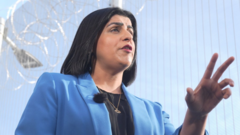Knicks’ communication issues cropped up again in ugly Game 1 loss







Best friends aren’t always forever — just ask the celebrities who have said goodbye to their famous BFFs for one reason or another.
From Selena Gomez and Demi Lovato growing apart to Lauren Conrad and Heidi Montag’s explosive feud on The Hills, not even the biggest stars can make their friendships last forever.
In November 2021, Big Short director Adam McKay revealed that his more than 20-year bond with Will Ferrell went sour in 2019 over a casting decision. “I f***ed up on how I handled that,” McKay admitted to Vanity Fair.
It’s safe to say these bonds can be broken — but they can also be repaired if both parties are willing to let bygones be bygones, which was the case for Lindsay Lohan and Paris Hilton.
Scroll down to see why these former celeb besties are no longer pals — and if any have made amends:

© Michael Buckner/Getty Images

© Kevin Mazur/WireImage

© Kevin Winter/Getty Images

© Emma McIntyre/Getty Images for SECNDNTURE

© Marion Curtis/Starpix/Shutterstock

© Matt Baron/Shutterstock

© Rick Rowell/Walt Disney Television

© Eric Charbonneau/Shutterstock

© Image Press Agency/NurPhoto/Shutterstock; Andy Kropa/Invision/AP/Shutterstock

© Matt Sayles/Invision/AP/Shutterstock; Mediapunch/Shutterstock

© Bei/Shutterstock

© Roger Wong/INFevents.com

© Sara Jaye Weiss/StartraksPhoto.com

© J.Sciulli/WireImage for PMK/HBH

© Berliner Studio/BEImages

© Steven A Henry/WireImage

© Stefanie Keenan/Getty Images

© Christopher Polk/Getty Images

© Ron Galella/WireImage

© Michael Buckner/Getty Images

© KMazur/WireImage

Despite overseeing United’s worst season in decades, including defeat in the Europa League final, Amorim will lead the team into next season

© Nick Potts/PA Wire

Sinner and Alcaraz’s developing rivalry has taken a new twist as the ahead of the next major at Roland Garros

© Getty Images

Barcelona are the clear favourites in Lisbon, but Arsenal have the chance to bring their journey full circle - while raising what it means to another level

© Getty Images

Punchier riders like Tom Pidcock, Wout van Aert, and Mads Pedersen are all likely to contend in Vicenza today

© giroditalia.it
European success has been the preserve of the French and Irish heavyweights in recent years but Northampton have hope of a second competition crown

© Getty Images
The rising passion for dogs has coincided with falling human fertility

© Copyright 2025. The Associated Press. All rights reserved
Costa Rica police seized five capybaras, crack cocaine and marijuana from a fleeing vehicle

© Drusillas Park

Kelly Agar Garcia, 43, has been charged with second-degree murder and unlawful storage of a firearm, following the incident on Wednesday evening.

© Polk County Sheriff's Office





Shreya Mishra Reddy.
This as-told-to essay is based on a conversation with Shreya Mishra Reddy, a 33-year-old Visa technical program manager completing Harvard Business School's Program for Leadership Development. It has been edited for length and clarity. BI has verified her enrollment in the program.
I'm an international student at Harvard Business School's Program for Leadership Development, and I'm reeling from the news of the Trump administration blocking Harvard from enrolling foreign students.
I moved to the US from India in 2021 to do my master's at Duke University, and then got my dream job at Visa in Austin.
After I started working at Visa, I came across this program at Harvard, which is an alternative to their executive MBA. I applied to that program, and I absolutely did not think that I would get accepted, but I did. It was one of the best moments of my life.
When I told my parents, they were so excited. I went from being a first-generation immigrant in the US to being accepted to one of the best schools in the world.
I took out a loan to fund the $50,000 tuition fee, and now I'm on the verge of completing the course. I just have one module left, from May to July.
I was at home in the middle of a meeting when I saw the news pop up on my phone that Harvard had been banned from accepting international students.
I went numb for a minute because I knew my module was supposed to start in a few days, and I was supposed to travel to Boston in July. My tickets are all booked.
When I read the news, the first thing I did was text my father back in India, saying that I don't know if I'm going to be able to graduate from Harvard. I don't know if I will be allowed back on campus or able to travel to Boston at all, and I'm really worried.
I've emailed the university to ask what was happening and if they had an update for us, but I haven't heard back yet.
I hope to hear back soon because the program starts in just a few days.
I was excited to start classes again, meet all the professors back on campus, and see my batchmates again.
Harvard's program was one of the best experiences I've had so far. The professors were extremely invested in our growth, and the candidates in my program held C-suite positions in Big Tech companies. The class discussions were excellent.
With this news, I don't plan to enroll in another school for the executive program.
Getting into Harvard was not just about a degree; it was about studying in one of my dream schools. It does not make sense for me to try to pursue the same kind of degree from any other school or country.
I'm now on an optional practical training (OPT) visa that expires in January, and I've not had any luck getting picked for an H-1B visa. So, I'm planning to leave the country in January.
But I don't know where I'll go or what I'll do. It's all up in the air now.


Brett Coomer/Houston Chronicle via Getty Images
JPMorgan CEO Jamie Dimon says executives who decide to take on the CEO job can expect two changes to their work.
"The first one is there is nobody to complain to," Dimon told The Economist in an interview published Thursday.
The second thing is that a CEO has to take ownership of their decisions, instead of deferring to their superior, Dimon continued.
"There is no tacit approval. It is your decision. It's just different. Heavy is the head that wears the crown," Dimon said.
Dimon, 69, has been serving as JPMorgan's CEO since 2006. After graduating from Harvard Business School with his MBA in 1982, Dimon turned down offers from Goldman Sachs and Morgan Stanley to join his mentor, Sandy Weill, at American Express.
Dimon left American Express with Weill in 1985. The pair would go on to take over Commercial Credit, a consumer finance company that became Citigroup after a series of mergers and acquisitions.
Dimon left Citigroup in 1998 and became the CEO of Bank One in 2000. He was named president and COO of JPMorgan after it merged with Bank One in 2004.
Dimon was asked about his succession plans on Monday at JPMorgan's annual investor day event. At last year's investor day, he'd joked that his retirement plan was "not five years anymore."
"We have built a very deep bench," Dimon said on Monday, adding that the board is "thinking about succession" — but didn't give names.
"If I'm here for four more years and maybe two more or three, executive chair or chairman, that's a long time," Dimon continued.
A representative for Dimon did not respond to a request for comment from Business Insider.


Kremlin Press Office
The Kremlin said on Thursday that it encountered at least 485 enemy drones across the country over the last three days, including 63 attempted attacks in the Moscow region.
In a statement on its Telegram channel, the defense ministry said the attacks were part of a "massive raid" by Ukraine across 13 Russian oblasts and the occupied region of Crimea.
"Air defense systems shot down 485 aircraft-type uncrewed aerial vehicles," the statement said.
Business Insider could not independently verify these figures, and as of press time, Kyiv has yet to issue an official statement on the attacks. But if accurate, the numbers indicate one of Ukraine's largest coordinated drone attacks on Russian soil since the war began.
"This is a new record for Ukraine," wrote Ukrainian analyst Petro Andryushchenko on his Telegram channel. "The longest-running attack by Ukrainian UAVs, which began around 11 p.m. on May 19 and lasted until 4 a.m. on May 22."
The exact extent of the damage caused is unclear.
Russia's description of the drones as "aircraft-type" also indicates that these aren't the typical first-person-view uncrewed aerial systems used as attack drones in the war. Such drones are likely too short-ranged to reach regions such as Moscow.
Rather, Ukraine has been using small fixed-wing aircraft that resemble the Cessna propeller plane and, while laden with explosives, are meant to fly directly into targets hundreds of miles away.
Moscow's traditional air defense systems have reportedly struggled to reliably take down these long-range drones, which fly at a maximum speed of 130 mph, much slower than a typical cruise missile.
Several reports this week suggested that some of the drones struck their targets.
Alexander Khinshtein, the acting governor of Kursk, wrote on Telegram on Thursday that a Russian official was sent to the hospital with a hip and arm injury after being hit by a drone.
Meanwhile, the popular independent Russian news Telegram channel Baza reported that a plant in the city of Yelets was evacuated due to a fire from a drone attack, with eight people injured. BI could not independently verify this information.
Ukrainian media also cited a map alert by NASA's Fire Information for Resource Management System, which indicated that a significant fire had broken out near an oil refinery in the Ryazan oblast.
The alert, seen by BI, indicated that the fire lasted between 12 to 24 hours on Thursday.
Andrii Kovalenko, head of the Ukrainian government's Center for Countering Disinformation, wrote on Wednesday that "unknown drones" had struck a plant in Oryol oblast that manufactured electronic parts for Russia's main battle tanks, fighter jets, and ballistic missiles.
Air transport hubs across the country, including the capital's four airports, were temporarily closed at times throughout the week. Similar incidents occurred in the days leading up to Russia's May 9 Victory Day parade, when Russian tourist organizations said nearly 60,000 travelers had their plans disrupted due to Ukrainian drone attacks.
That week, the Kremlin said it had fought off an even larger drone attack of 524 uncrewed aerial vehicles, as it prepared to host two dozen world leaders for the parade to celebrate its military.
The latest series of attempted strikes came just after Russian leader Vladimir Putin and President Donald Trump ended their third phone call on Monday to discuss a cease-fire. The call had ended without a conclusive next step toward peace.
Meanwhile, Kyiv said that Russia launched hundreds of drone attacks this week at Ukrainian cities, including a reported 273 drones on the day before the Trump-Putin call.
Moscow typically deploys a different type of drone, the Iranian-designed Shahed, to attack urban centers in tandem with cruise or ballistic missiles.






